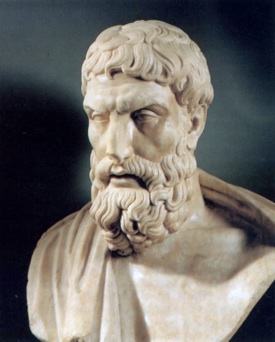
1. We must exercise ourselves in the things which bring happiness, since, if that be present, we have everything, and, if that be absent, all our actions are directed towards attaining it.
2. "Divine Beings" exist, but they are not as people imagine them to be. Beings exist in the universe who are perfectly happy and deathless, but perfectly happy beings do not cause trouble to others, or reward friends or punish enemies. The beliefs that most men hold about these beings are wrong, and we should never attribute to them any characteristic which is inconistent with their perfect happiness and completeness. It is not we who hold this opinion who are impious, but those who assert that divine beings can be angry with or give rewards to men.
3. All we experience comes to us through sensation while we are alive. When we die, we lose all sensation, and we cease to exist, and that means that death is a state of nothingness to us about which we should have no concern. Therefore do not fear death or wish it to come too soon; all men of any age should value their time as their only opportunity to be happy.
4. The future is neither totally within our control nor totally outside our control.
5. Some of our desires are natural and necessary, some are natural but not necessary, and some are neither natural nor necessary. All our decisions in life, all those things we choose and all those things we avoid, should be selected according to whether they bring us health of body and happiness of mind. Once we have attained health of body and happiness of mind we have no need of desires which are beyond our capacity to achieve.
6. In all decisions in life our guiding goal is Pleasure, and it is the standard by which we judge whether anything is "good." But it for this very reason that we do not mindlessly pursue every pleasure of the moment, because some actions bring about consequences of pain which outweigh the pleasure which may come for a time. All our actions must be judged according to whether they bring us a pleasurable or painful life.
7. Independence from things the world holds to be valuable and luxurious is a great blessing, not because we value austerity, but because when we are independent we need not fear the loss of our independence and the pain which that brings. Conditioning our habits to simplicity is therefore generally wise, not so that we may always live in poverty, but so that we can truly enjoy those luxuries which we can obtain without loss of the pleasure of independence.
8. Those who assert that the pursuit of Pleasure leads to a prodigal or degraded life are ignorant, prejudiced, or willfully misrepresenting the truth. Sober reasoning as to the best course of maximizing a life of pleasure removes our fears and anxieties, and so wisdom is more precious to us than anything else, for from it springs our understanding of all that is virtuous. The term "virtue" is nothing more than those characteristics of life, whatever they may be, which in fact lead to pleasurable living. Those who assert that we should pursue virtue for its own sake are beguiled by the high-sounding beauty of the word, and they lose sight of the goal of life by looking entirely to attributes of character, which are simply methods of living. These methods, by themselves, are valueless. Taken alone and out of their context as servants of the goal of pleasure, these methods do not always produce happiness, and they often in fact produce the greatest disasters.
9. The goal of Pleasure gives us a proper understanding of the highest life possible to us. The highest man holds holy opinions about divine beings and is free from fear of death. The highest man understands that within the limits fixed by Nature full and complete happiness is possible, and intense pain is either brief or avoidable. The highest man scorns "fate" and "luck," and knows that some things happen by chance and some things happen because of factors out of his control, but that much is within his control. Thus the highest man affirms that he will never bow beneath the yoke of "destiny," and he works to free himself from both "chance" and "necessity," because he sees that his greatest hope for happy living comes from living wisely.
10. It is possible to live as a god among men - the key is to learn how to live properly by pursuing wisdom through the study of Nature.